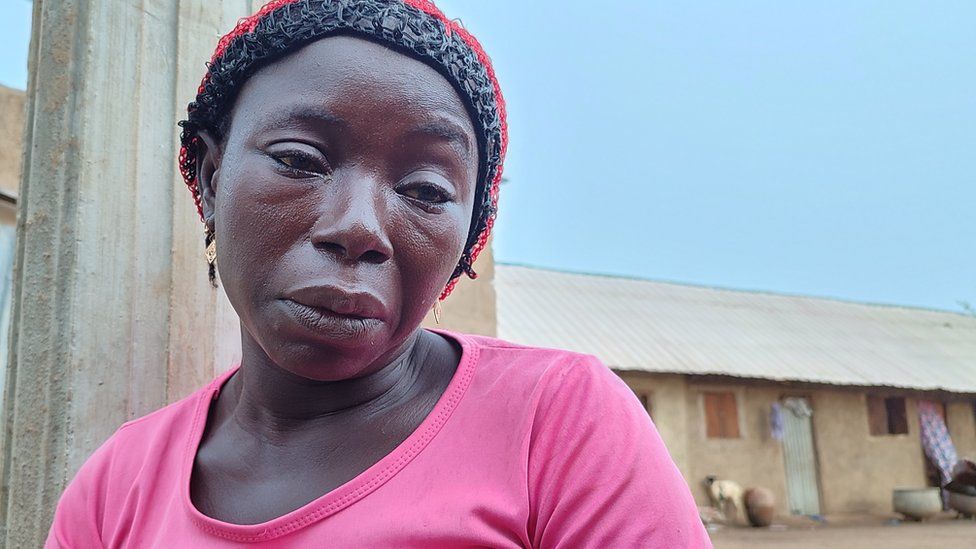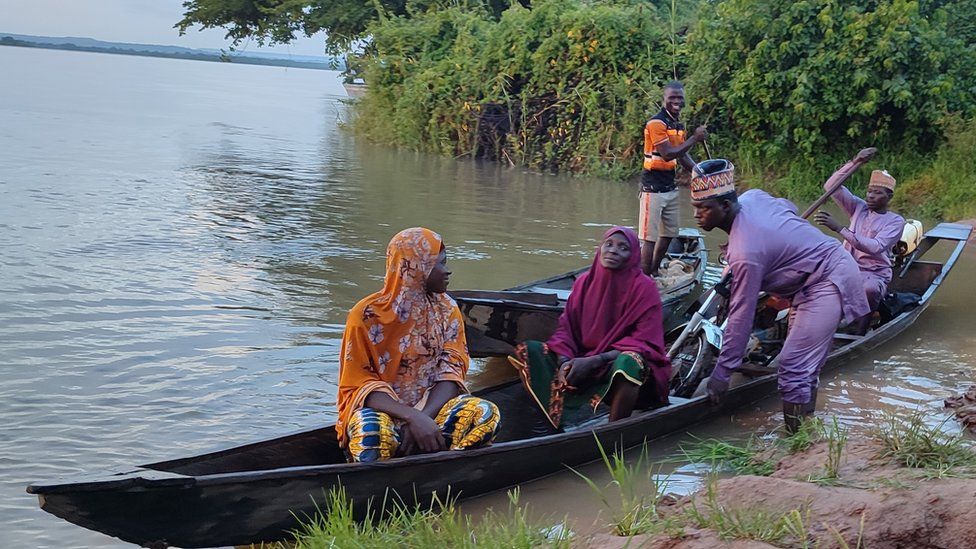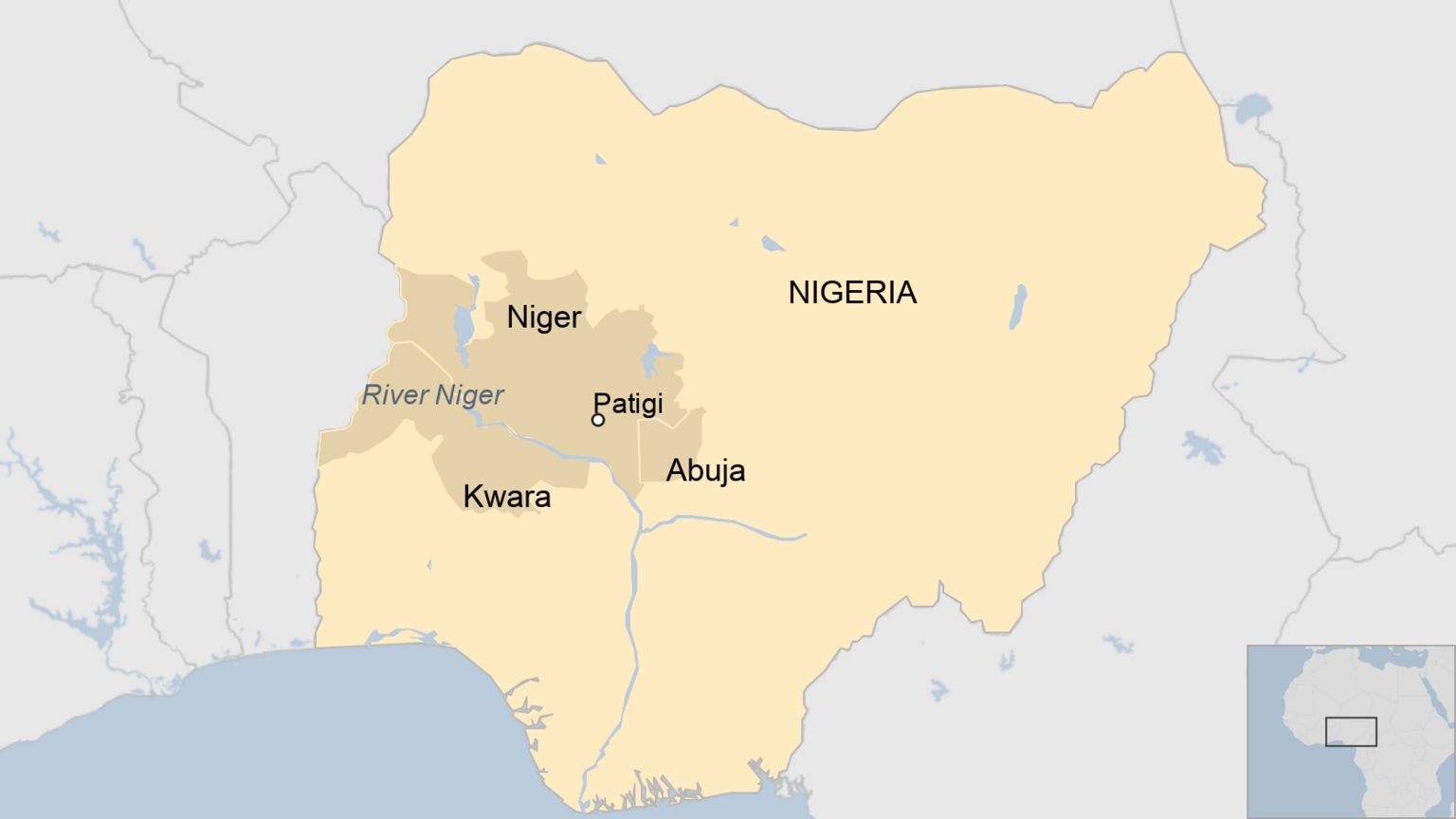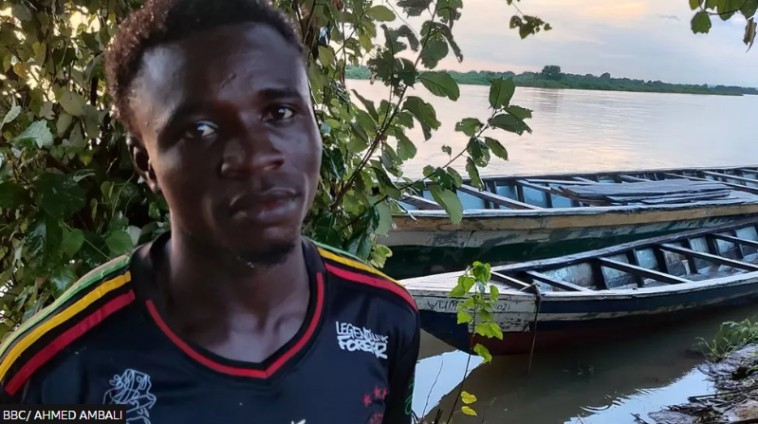Among the more than 100 people who drowned earlier this week when a boat capsized on the River Niger in central Nigeria were many parents trying to save their children, a survivor tells the BBC.
Mohammed Alhassan, 22, was one of about 300 people travelling on the overcrowded wooden boat in Patigi in Kwara State.
Many were returning from a wedding. But not Mr Alhassan - he was returning from a market.
He shows no emotion as he returns to the bank of the river where he had managed to swim to safety.
It is low tide when I meet him. The river is still and his gaze is fixed on the horizon.
But as he remembers the parents who drowned with their children, including his sister and her eight-year-old son, the tears come flooding down his face.
"The women remained behind trying to carry their children - some of them had three or four children.
"There were also fathers who died the same way trying to save their kids," he says.
Had he tried to help save them too, he would have drowned, he says.
So he swam to safety, but as he did so, he saw the horrifying scene as mothers and fathers sank along with their children as they tried to save them.
He is thankful he survived but still traumatised from seeing all those people die, especially the children.
Close to 300 people were travelling in the wooden boat when it capsized on Monday, authorities said.
Travelling across the Niger, Nigeria's longest river, can be perilous in some areas. The wooden boats are often overcrowded, there are not enough life jackets and some of the journey is made in the dark, so accidents are not uncommon especially during the rainy season between April and October.
Most of the incidents happen in the central Niger state and neighbouring areas. Three years ago in Kebbi state at least 50 people died after their boat capsized.
There have also been other deadly boat accidents recently in Kano in the north, and the southern states of Lagos and Anambra, where 76 people died in October last year.
Despite the dangers, for many communities that live on the banks of the River Niger, it is the only form of travel they know.
Most of them, like Mr Alhassan have made the journey countless times in the past.
He was sitting at the head of the boat this time, he recalls.
The boat had left in darkness just before 03:00GMT, some of the children had dozed off in their parents' arms and were carried on board.
But five minutes after they took off, he heard a loud crack that split the boat in two, he says.
The police say the boat capsized after part of the vessel collapsed, causing it to flood. But the Emir of Patigi - the local traditional ruler - told journalists that river waves overtook the boat and forced it to crash into a tree that had washed into the river.
In Ebo, a community in Kwara state which lost 61 people in the tragedy, many of the young survivors have gathered under the biggest tree in the middle of the village.
On another day, they might have been discussing a football match or joking with each other, but they are in mourning.
Some of them were on the boat and managed to swim to safety but the horrors of seeing friends, relatives and strangers they had met at the loading dock drown, is one they will never forget.

Aisha Mohammed, who lives close to the tree, was not on the boat but her three daughters were.
She had bid them farewell as they travelled to the wedding, looking forward to the day when guests would come to her house for wedding ceremonies. All three daughters were set to get married this year, she says in the local Nupe language.
"We are all grieving from this sad incident and only pray Allah to ease our pains," says the local chief Liman Umar.
"In our community we do things together. When we rejoice, we do as one and now that this has befallen us, we are all not sleeping," he says.
He was coordinating the rescue efforts, relaying information from the divers to the emir but that has now been abandoned.
Local people say they have faced heavy rains in the last couple of days and received no help from the government to find survivors.
They are now waiting for missing bodies to float to the river surface so they can collect them, their leaders say.
Some of the boats that ply the Niger travel at night to evade authorities and passengers are often indifferent about the life jackets, many tell me.
But this has to change says Abdul Gana, a local leader in the nearby town of Kpada which lost four people in the tragedy.
"We want government to wade in and provide protective gear for the people whenever they make use of the boats."
"The governor should look into road infrastructure - the reason our people prefer travelling on the Niger is because there are no access roads to link up with other communities," he says.

It is a sentiment shared by state governor Abdulrahaman Abdulrazaq, who visited the community to offer condolences.
He talked about providing 1,000 life jackets to the community to enhance their safety during travels.
There was also talk of stronger laws to punish those who refuse to abide by safety regulations.
But as he left, the banks of the Niger were already teeming with the wooden boats and their passengers, hardly any of whom were wearing life jackets.
There is a feeling the life jackets will take some time to arrive, but like the flow of the tide on the Niger, life must continue.

Latest Stories
-
Bayer Leverkusen’s Jeremie Frimpong donates to Osu Children’s Home in Ghana
6 minutes -
GPL 2024/25: Heart of Lions beat Young Apostles to go three points clear
37 minutes -
Dance battles, musical chairs light up Joy FM Party in the Park
58 minutes -
Kwabena Kwabena, Camidoh, Kwan Pa Band, others rock Joy FM Family Party in the Park
1 hour -
GPL 2024/2025: Aduana beat struggling Legon Cities
1 hour -
GPL 2024/25: Bechem United fail to honor match against Holy Stars
1 hour -
Cooking competition takes centrestage at Joy FM Family Party In The Park
2 hours -
Album review: ‘Wonder’ by Nana Fredua-Agyeman Jnr
4 hours -
Bouncy castle, sack race, and smiles galore: Joy FM Family Party takes over Aburi Gardens
4 hours -
Watch: Kwan Pa Band thrills patrons at Joy FM Family Party in the Park
4 hours -
Akufo-Addo partly to blame for NPP’s defeat in 2024 election – Frank Agyekum
4 hours -
Rapid urbanisation endangers children’s mental health – Psychiatrist warns
4 hours -
Kedland International School hosts maiden Festival of Nine Lessons and Carols
4 hours -
I didn’t speak against holding wrongdoers accountable – Rev. Kwadwo Bempah clarifies ORAL comment
5 hours -
RSS Developers to hold 3-day open house event on home purchasing from Friday, Dec. 27
6 hours

